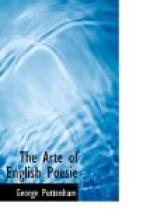The figure Ouall.
This figure taketh his name of an egge, and also as it is thought his first origine, and is as it were a bastard or imperfect rounde declining toward a longitude, and yet keeping within one line for his periferie or compasse as the rounde, and it seemeth that he receiueth this forme not as an imperfection but any impediment vnnaturally hindring his rotunditie, but by the wisedome and prouidence of nature for the commoditie of generation in such of her creatures as bring not forth a liuely body (as do foure footed beasts) but in stead thereof a certaine quantitie of shapelesse matter contained in a vessell, which after it is sequestred from the dames body receiueth life and perfection, as in the egges of birdes, fishes, and serpents: for the matter being of some quantitie, and to issue out at a narrow place, for the easie passage thereof, it must of necessitie beare such shape as might not be sharpe and greeuous to passe at an angle, nor so large or obtuse as might not essay some issue out with one part moe then other as the rounde, therefore it must be slenderer in some part, & yet not without a rotunditie & smoothnesse to giue the rest an easie deliuerie. Such is the figure Ouall whom for his antiquitie, dignitie and vse, I place among the rest of the figures to embellish our proportions: of this sort are diuers of Anacreons ditties, and those other of the Grecian Liricks, who wrate wanton amorous deuises, to solace their witts with all, and many times they would (to giue it right shape of an egg) deuide a word in the midst, and peece out the next verse with the other halfe, as ye may see by perusing their meetres.
When I wrate of these deuices, I smiled with myselfe, thinking that the readers would do so to, and many of them say, that such trifles as these might well haue bene spared, considering the world is full inough of them, and that it is pitie mens heades should be fedde with such vanities as are to none edification nor instruction, either of morall vertue, or otherwise behooffull for the common wealth, to whose seruice (say they) we are all borne, and not to fill and replenish a whole world full of idle toyes. To which sort of reprehendours, being either all holy and mortified to the world, and therefore esteeming nothing that fauoureth not of Theologie, or altogether graue and worldy, and therefore caring for nothing but matters of pollicie, & discourses of estate, or all giuen to thrift and passing for none art that is not gainefull and lucratiue, as the sciences of the Law, Phisicke and marchaundise: to these I will giue none other aunswere then referre them to the many trifling poemes of Homer, Ouid, Virgill, Catullus and other notable writers of former ages, which were not of any grauitie or seriousnesse, and many of them full of impudicitie and ribaudrie, as are not these of ours, nor for any good in the world should haue bene: and yet those trifles are come from many former siecles




